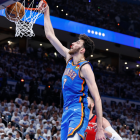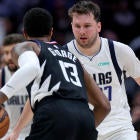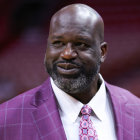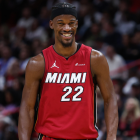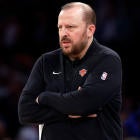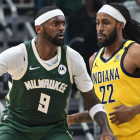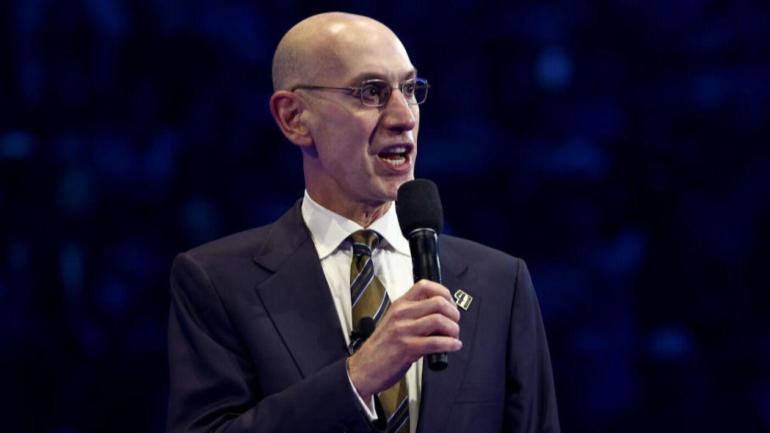
NBA commissioner Adam Silver's head is in the right place. Tanking is a serious problem in his league. Of the four major American sports, basketball's competitive landscape, for the sheer heliocentric nature of the game, is the one most disproportionately altered by the addition of a single player.
You get LeBron James, your franchise skyrockets overnight. The financial rewards are immediately enormous, and the competitive ones often follow. I don't know if you've seen presumed 2023 No. 1 pick Victor Wembanyama play, but as something of a 7-foot-2 Kevin Durant, he appears to be cut from a similar can't-miss cloth.
How do you get Wembanyama?
For starters, you lose. A lot.
To be fair, losing doesn't guarantee a top pick. That's been the case since 1966, when the worst teams from each conference, record wise, would flip a coin for the top pick, with the "loser" drafting second. The lottery system started in 1985, which simply tossed each non-playoff team into a hat and randomly drew for draft order, affording each non-playoff team the same odds of securing any one of the lottery picks.
I would argue this original, non-weighted lottery system remains the simplest format to rid the league of tanking, or at least extreme tanking. You may get a few borderline playoff teams dumping a few games at the end of the season to drop below the cut line, but there would be no incentive to go on a season-long losing crusade.
1990 is when the foundation for tanking began. That's when the weighted system was introduced, meaning the team with the worst record had the best odds of landing the No. 1 pick. In 2017, the NBA, in an attempt to moderately discourage this practice of losing on purpose, flattened the lottery odds so that the three teams with the worst records all have an equal 14-percent chance of landing the top pick.
Still, you're very much incentivized to be one of the three worst teams, which requires a lot of losing. Basketball is a game of shots, and while the outcome of any given shot is never guaranteed, the smartest teams seek out the most statistically justified attempts. You don't have to be a math geek to understand that a 14-percent chance is better than the 12.5-percent chance the fourth-worst team has, or the 10.5-percent chance the fifth-worst team has, and so on.
Not only that, but the lottery only determines the top four picks. After that, the 5-14 lottery picks are slotted in reverse order of the previous season's standings. if you have the worst record of the teams remaining after the lottery draw, you get the fifth pick, and down the line it goes. In other words, if you have the worst record in the league, you share the highest odds of getting the top pick with two other teams and are guaranteed to draft no lower than No. 5.
It speaks to an important, if obvious, point: It's not just getting the first pick that matters. Every spot you rise on the board, control over your destiny increases. In 2009, the Golden State Warriors famously drafted Stephen Curry, who turned out to be the LeBron-like franchise changer from that class, at No. 7 overall. The Knicks, who drafted, No. 8 that year, wanted Curry. A few more losses and maybe they jump one spot and get him, and just like that it's New York, and not the Warriors, who potentially turn into a title factory.
Instead, the Knicks won 32 games in 2008-09. Nowhere near enough to make the playoffs. What's the point of, say, 10 extra wins with a better shot at a player like Curry, or James Harden who went No. 3 that year, or Blake Griffin who went No. 1, at stake? And so it is with the elephant that remains in the NBA's draft room.
Silver can talk all he wants about "paying particular attention to the issue" of tanking. He can have, as he recently said, "hundreds" of meetings about curtailing the problem. It won't matter. As long as there is incentive to lose, the teams without a legit playoff roster, or, frankly, even some of the teams that could scrape in if they wanted to, are going to continue to lose.
You can't blame them. In a lot of cases, these are organizations that do no qualify as free-agent destinations. The only viable way to any sort of meaningful contention is through the draft, either by selecting a franchise-changing player or trading a high-leverage draft slot as the core of a package for en established star. Either way, the higher your draft pick, the better spot you're in.
Meanwhile, it kills the NBA's product. Fans are paying good money, in some cases ridiculous money, to watch the best players in the world put on a show. Never mind the "load management" problem that leaves fans saving up all year to go watch their favorite player -- only to get that player's backup so the multi-millionaire who is only a multi-millionaire because fans pay his salary can rest. Now you have to go watch teams actively try to lose on top of it.
What's the solution? That's not for me to figure out. I just know there are options. As I said earlier, ditching the weighted-odds lottery for one that gives all non-playoff teams the same shot at a given draft slot cures a lot. In theory, you want to help the worst teams the most, but that's what leads teams to try to be the worst.
No system is perfect, and this one would still be helping a bad team, in a lot of cases one that would be really ready to compete with the addition of just one top talent, rather than the way it is now where a top pick goes to a team that still needs to lose for three or four more years to put enough top picks together to put a competitive team on the floor.
Hello, Oklahoma City.
You could also eliminate the draft altogether. Treat incoming players as free agents. Salary-cap rules still apply. If you want a top pick, you plan your salary structure accordingly. You might worry about big-market teams with more financial backing hoarding all the best draft picks, but in most cases these teams are competing for titles, and you can't compete for titles in today's NBA with a cap sheet that has enough room left over to also pay a top draft pick.
I've also heard the idea floated that the lower you finish in the standings, the lower percentage of the tax-distribution pie you receive. See, when teams go into the luxury tax to pay for star-studded rosters, that money gets redistributed among all the non-tax teams. If losing on the court starts leading to losing actual money, watch how fast these billionaire owners stop trying to lose.
Another idea is to hold a tournament at the end of the season. Put the 14 non-playoff teams in a bracket and let them play for picks. Might that lead to the unintended consequence of players who might be the ones replaced by the next year's draft pick not exactly giving their best effort in this tournament? Perhaps. Unintended consequences tend to be what takes down all these ideas. When it was decided that a weighted lottery system would best serve the franchises in greatest need, nobody thought it would turn into The Process brought to you by Sam Hinkie.
But it did. And it worked. The Sixers lost, on purpose, for years, and it netted them Joel Embiid and Ben Simmons, the latter of which netted them James Harden. And now they're contenders. You can't expect franchises whose only viable path to winning is, in fact, to lose, to shun the strategy in the romantic spirit of honest competition. This is big business.
Like tax loopholes for the rich, if you've created, intentionally or otherwise, a system that is open to blatant manipulation, you can't ask the manipulators who are only serving their best interests within the confines of the rules to stop doing what they're doing. You have to change the system.
It wouldn't be an easy sell. It might be impossible, frankly. These bottom-dwelling owners probably aren't going to give up the one competitive advantage they own, nor do they want their currently capped rookie-scale contracts opened up to market value, which would force them to actually pay fair money through the first four years of a player's career. But again, figuring out a system that is acceptable for everyone, that could realistically win enough support to pass through an owners' vote, isn't my job. It's Silver's. He says he's seriously concerned about tanking. Will he find a way to do something about it?















